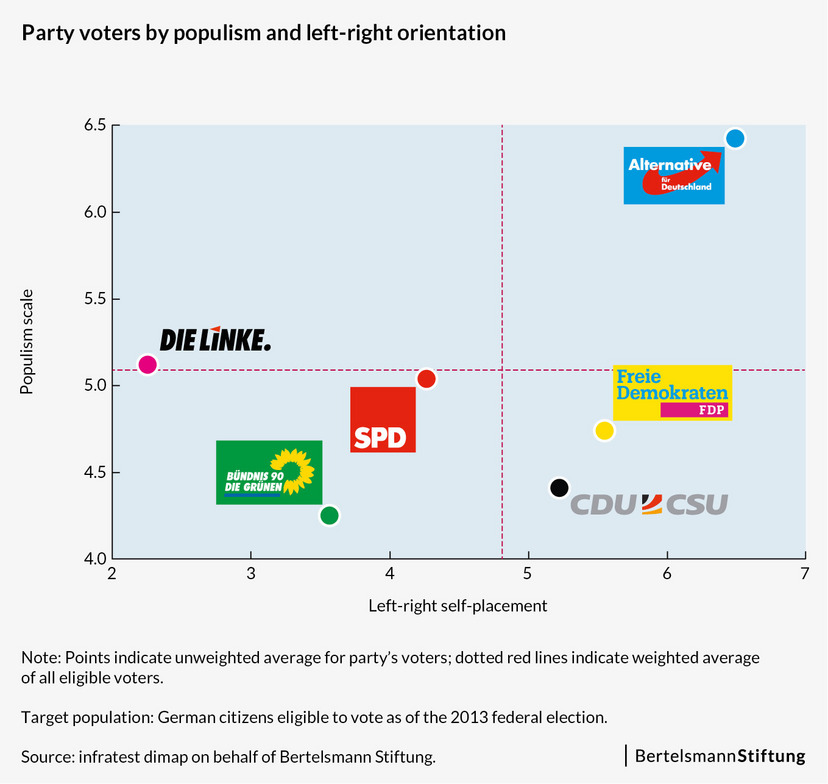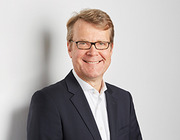Donald Trump was elected president in the US, the vote to leave the European Union was a huge victory for UKIP in the United Kingdom, Marine Le Pen of the Front National and Norbert Hofer of the FPÖ made it to the run-offs in the presidential elections in France and Austria, and the pronouncements made by Geert Wilders played a key role in the Dutch parliamentary elections. In Southern Europe, Movimento 5 Stelle is currently the second largest party in Italy’s parliament and one of its candidates is now mayor of Rome. In Spain, the Podemos party placed third in the last parliamentary elections and, in Greece, Alexis Tsipras of Syriza is prime minister. In Germany, the Alternative für Deutschland (Alternative for Germany) party, or AfD, is now represented in 13 of the country's 16 state parliaments. These parties and individuals have made considerable political gains by expressing populist sentiments. Will Germany’s national elections in September also become "a populist Moment"? Our study defines what populism actually is and, based on three representative surveys, provides a differentiated picture of how widespread populist attitudes are among the country’s voters and non-voters in the run up to the elections.

Shutterstock / wellphoto
Before the election: Majority of Germans reject populist views
From Syriza and Podemos to Le Pen, Brexit and Trump: Political parties and individuals on both ends of the political spectrum have recently used populist sentiment to score political points. How do things look in the run-up to Germany's national elections? Our study defines what populism is – and shows that a majority of Germans do not hold populist views.
Content
Which viewpoints are populist?
Populism always reflects an anti-establishment attitude. It is critical of established parties and institutions and, often, the media. In its radical form, populism fundamentally questions the legitimacy of these institutions and wants to overthrow the ruling political parties and radically overhaul the political system; in its more moderate form, it does not completely reject traditional institutions, but criticizes certain aspects which it wants to improve. It also assumes that there is only one will of the people, which should be implemented through the political system and, above all, through more direct democracy. In addition to having anti-establishment attitudes, other characteristics of populist movements are that they emphasize pro-popular-sovereignty and anti-pluralism, and reject pluralistic decision-making and will-building institutions and processes.
Majority of Germans reject populist views
According to the study's findings, although about 30 percent of Germans have populist attitudes, some 37 percent reject populist viewpoints and approximately 34 percent only endorse them to a limited extent. Moreover, most of those who can be described as populist have moderate and not radical attitudes. A majority of Germans thus do not hold anti-establishment and anti-pluralist views.
The political climate in the run-up to the national elections is anything but 'a populist moment.'
Aart De Geus, chairman of the Bertelsmann Stiftung Executive Board
A more moderate form of populism
Populism in its German form is more moderate than radical. For example, more than two-thirds of Germans with populist attitudes are in favor of their country being a member of the EU and 85 percent support democracy as a political system. At the same time, over three-fourths feel that European integration has gone too far, and a small majority of 52 percent say they "mostly disagree" or "strongly disagree" when asked if they believe that German democracy functions as it should.
Populists in Germany are often disappointed democrats, but they are not radical enemies of democracy. Criticism of the political establishment is much weaker in Germany than in the US or France.
Robert Vehrkamp, democracy expert at the Bertelsmann Stiftung
Populist attitudes largely depend on educational level and social background
A social gap exists in Germany when it comes to populist attitudes, since the less formal education and less income people have, the greater the chances they will hold populist views. For example, the strongest populist attitudes tend to be found among people who have not completed their secondary education or have graduated from one of the country's lower-level secondary schools and who have an average monthly income of less than €1,500.
Populism present across the political spectrum
Populism is not a phenomenon found only on the left, right or in the center of the political spectrum. Populist voters can be found in every political camp. Yet differences can be observed among the various political parties in Germany. According to the study, the Christian Democratic Party (CDU) has the least populist adherents, even together with its sister party, the Christian Socialist Union (CSU). It is supported by up to 60 percent of non-populist voters. The Social Democrats (SPD) and the Left party (die Linke) are supported by populist and non-populist voters in roughly equal measure. The party whose supporters are the most populist is the AfD, at approximately 60 percent.

Bertelsmann Stiftung
From the left to the right: How German party voters can be seen on the populism scale.
Radical populist positions do not appeal to most voters
In the US, Donald Trump's promise to overthrow the ruling political elites helped win him the presidency. Such radically populist ideas generally do not appeal to German voters. As our study shows, the more populist and anti-establishment the positions taken by a political party, the less support it gets from the electorate. Radical calls for overthrowing the elites even have a negative impact on a party's chance of winning at the polls. Pro-establishment positions, on the other hand, generate higher levels of support, meaning that parties can score points with voters by taking a pro-European stance.
Refugee policy mobilizes AfD voters more than others
The issue that currently most energizes populists in Germany is the country’s refugee policy. In terms of mobilization, the typically highly populist AfD voters focus on one issue more than supporters of any other party, says Robert Vehrkamp. For example, calls to deport "large numbers of refugees" result in a significant increase in support from AfD voters (plus 51 percentage points). Anti-refugee positions, however, do not generally increase support from adherents of other parties, who instead favor a more moderate and controlled approach to admitting refugees into the country.



